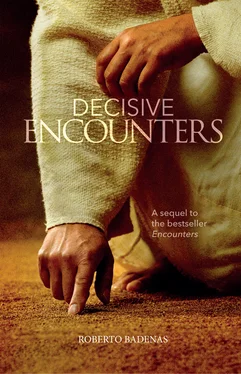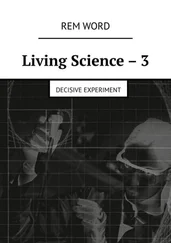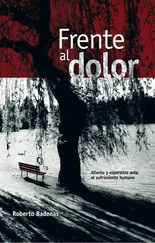Perplexed at this crossroads of paths, the young men do not know what direction to take. That is why they have traveled from afar to here, the ford of Bethabara, driven by their uncertainty and by their absolute thirst, to hear the new prophet in person. Compelled by his message, they have answered his call:
Repent, for the kingdom of the heavens approaches, and demonstrate through your fruits the conversion of your hearts. Let God cleanse you of your past, being reborn, through baptism, into a new life. Only God can save us from ourselves and transform us through his power. I baptize you with water, to mark the breaking of a new birth, but He who comes after me will submerge you in the atmosphere of the spirit.
They have heard it from his lips. To quench their spiritual thirst, the restless travelers have to steer their course toward a new guide, and such is not the Baptist.
Are you not the awaited Messiah? his opponents had asked.3
No, I am not. I am but a voice calling in the desert to prepare the way for him. The Teacher who is to come is your guide. Moreover, He is the proclaimed Lamb of God, the only one capable of saving the world from its sins and of opening the gates of heaven for us all.
The clue does not seem very clear, but the travelers already know that the key to what they are seeking is not there, in the ford of the Jordan, neither in the caves of Qumran, nor in the temple of Jerusalem; and neither in the daggers of the Sicarii nor in the classrooms of the Teachers of the law. The course to follow will be indicated by the promised Savior.
Their restlessness is incited when the prophet points out in the distance, with his gaunt right hand, a wayfarer walking down the side of the mountain:
At last, there He comes. Follow him wherever He guides you.
Seized with emotion, the young men impatiently draw near to encounter Him. That man who approaches whistling, with an angular, sun-tanned face, is the Teacher whom they must follow.
But the wanderer is unaware that He is expected and continues without stopping.
Although His pace is steady, He does not appear to be in a hurry, and the young men do not have any trouble catching up to Him. Intimidated by His proximity, they do not dare to address Him and walk behind Him, feeling inhibited. They follow Him so closely that the traveler notices their presence, stops while smiling, and with a deep but welcoming voice, asks them:
What do you seek?4
The young men, taken aback, do not manage to reply, because they do not know how to articulate what they seek. They feel disoriented, confused, dissatisfied with their lives and wish to find a path that will give them meaning and make them happy. But they do not know how to put into words the object of their search.
The Baptist had given the traveling Teacher the enignamtic title of “The Lamb of God.” 5 Strange name that, like a key or a secret code, seems aimed at clarifying a mystery. However, they, at the moment, have few details to resolve the enigma.
The Lamb of God so far from the temple, apart from the altars, alien from the circle of priests and their sacrifices?
The lone traveler, who does not exude an aroma of either incense or smoke but of thyme and rosemary, repeats his question. And it has nothing to do with rites, clergy, or theologies: it has to do with them, with their lives, with their here and now:
What do you seek?
What they seek is undoubtedly not very different from what other serious young people search for at some point in their lives. They seek, beyond any immediate urgency, what they truly lack in order to direct their dissatisfied existence: a reliable guide, a lasting love, someone with whom to share life, a gratifying vocation, a faith, a project that will make them dream.
What do you seek? The traveler insists.
And they, who cannot envision what they seek, muddle through with another question:
Teacher, where do you reside?
They want to know where to find the Teacher when they need him. Their question is equivalent, in an indirect and possibly unconscious manner, to the answer: “Perhaps we seek you.” Because many times, without knowing, we seek something when in reality we need Someone.
The two friends wanted to know where they could listen to the teachings of the new rabbi recommended by the Baptist. They do not expect anything now nor do they ask for anything special. They do
not feel worthy of the personal attention from someone like Him. They want only to join the group of His possible followers. They hope that it will grant them access to the privilege that is enjoyed by the disciples of the few Teachers they know in their environment: to attend on a regular basis, after the day’s occupations, the place where the Rabbi shares His knowledge. They have so many concerns that, in a brief meeting, along the side of the road, they cannot receive what they yearn for. They desire to be alone with Him, to sit at his feet and receive his teachings.6
Their question is timid and respectful; it indicates, further, that those males are younger than the one whom they already call “Teacher.”7
Jesus understands their question well. He also knows that “to reside” is more than to stop for a moment. To reside is to dwell, to inhabit, to live in, or to remain. And He has no intention of staying there, by the desert. For that reason, he does not show them a place, but a presence:
Come and see.
That is, “Follow Me.”
To the surprise of the travelers, the new Teacher does not confine himself to any permanent domicile. He lives in the “come” and “see” of those who follow him. He is found coming and seeing: departing from where we are and discovering what we could not see. Drawing nearer to it and observing closely . . .
The traveler tells His road companions that in order to find what they seek, it is enough for them to come and see.8 If to come one must get under way; to see, one need only to open one’s eyes. The essence of their search entirely rests upon two action verbs, which he conjugates as two invitations: to approach him, and to keep the eyes of the soul wide open.
Additionally, God, whom they truly seek, can be found everywhere, even where most unexpected. It is not necessary to turn to sacralized spaces for that purpose, where some would like to demarcate the privileges of the encounter. Because there are people who soon after becoming aware of a place where someone once had a glimpse of the divine immediately take control of it and create upon it an oratory, a temple, a basilica or monastery, which they zealously keep under their own tutelage. To find him, you need only follow him. And that is what John and Andrew are doing.
With this warm welcome, with his intriguing message, and with the endearing enchantment of his voice, Jesus bewilders those who are accustomed to being guided through orders and prohibitions. He unsettles and disorients them, because the Baptist himself had incited them to the conversion wielding threats of axes and fire.9 Jesus proposes a transformation that goes in the same direction but through a different route, despite also using strong images at times. In this manner, a new era in the spiritual experience of these young men is ushered in. The speech from the Baptist served, at the time, to raise in them the fear of the divine judgment; but, to the new Teacher, what these young men now need is not to tremble in fear but to shudder with enthusiasm.10
He knows the depth of their thirst and what can transform their lives. That is why He invites them to follow Him, not with orders or demands, and not with resorting to the fear of punishment, but with a simple and cordial welcome, making them desire the adventures of discovery. His positive pedagogy arouses in these young men the urge to progress, advance, and grow.
Читать дальше












